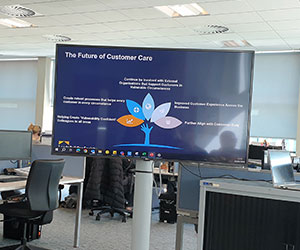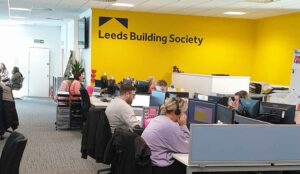Our Editor Megan Jones visited Leeds Building Society, as part of a Greenbean Talking Talent event, to find out more about the initiatives that helped them win People-Centric Organisation of the Year at the 2023 NECCA – North East Contact Centre Awards.
Here’s what she learnt about how to take your employee experience to the next level…
| Leeds Building Society Fact File | |
|---|---|
| Contact Volumes | |
| Annual Inbound Calls | 2023 – 677,871 // 2024 – 258,154 |
| Annual Outbound Calls | 2023 – 298,019 // 2024 – 106,728 |
| Other Channels | Social Media and Email |
| Contact Centre Size | |
| Number of Full-Time Agents | 147 Heads (135.2 FTE) |
| Technology | |
| ACD | Avaya CMS |
| WFM | Calabrio |
| Any other tech | SAP, Power BI for reporting, Thrive learning portal |
1. Always Use the Word ‘Trial’ When Rolling Out New Initiatives
When rolling out a new initiative, always refer to it as a ‘trial’. That way it becomes a test for everyone, encouraging feedback and allowing space for learning.
The ‘trial’ makes it clear to your colleagues that it’s an experiment (not a guaranteed fixture), and if it is an enhancement to your colleague proposition, for example, flexibility in breaks or working hours, they have an interest in making it successful, so they need to lean in and make it work.
This careful choice of language is far more flexible than saying “we’re rolling out this new initiative”, as the latter can feel a lot more rigid.
This approach also gives leaders more breathing room for rolling back ideas if they don’t work out as initially hoped.
2. Keep New Recruits in the Office to Help Them Make Friends
To support their hybrid model, Leeds Building Society ask new recruits to work office-only for the first six months of their tenure.
Why? They find this helps them to learn from and build relationships with their peers, as well as absorb the company culture.
It also fosters a desire to spend time in the office – even when they have the freedom to work hybrid at the end of their probation period.
This approach has proven to be an overall success, as around 70% of people are in the office at any one time (because they want to be there) and they only have 12 people permanently working from home.
Quick Tip – Record Podcasts With the Senior Leadership Team
Organizing regular podcast recording sessions with the senior leadership team is a creative way to strengthen communication across the organization.
When combined with Q&A, this can help frontline agents better understand current changes and events.
3. Share Industry Statistics to Drive a Sense of Purpose
It can be challenging to create a strong sense of purpose across your teams, but Leeds Building Society have discovered a good way to achieve this goal – by sharing compelling statistics with their colleagues.
For example, the leadership team draw on stats such as “49% of prospective first-time buyers fear they might never be able to buy their own property” to highlight the challenges customers are facing.
When the facts around the issues customers are facing are clear to see, it also helps to drive proactive conversations around “how can we make a difference?” and “what can we change?”
Quick Tip – Ask Your New Recruits What They DON’T Like
A good tip for building openness and making sure everyone feels they have a voice is to host a quick session every month to ask new recruits “what don’t you like about working here?”
This helps to instil an open culture and connection early on – as well as nipping any challenges or miscommunications in the bud.
4. Create a Dedicated Care Team to Support Grieving Customers
Following a review of their bereavement processes, leadership formed a dedicated customer care team – bringing together six experienced colleagues who are passionate about vulnerability and bereavement.
This team is accessed via a dedicated bereavement webpage and phone number – so these calls don’t go through the main contact centre or IVR – and the customers are given additional support.
This extends to being given a dedicated single point of contact throughout the process, as well as signposting for grief support.
For the agents taking the calls, there’s also additional support in place. For example, they have a “stop the clock” initiative – so no average handling time or after-call time is monitored on these calls. They are also supported emotionally and know “it’s OK to cry” and stay off the line if they need to.
This team also acts as additional support for the wider contact centre, such as taking over when an agent may be struggling to handle a vulnerable customer or is finding a conversation particularly triggering based on their own personal circumstances.
5. Give Neurodiverse Colleagues a Voice
The Society have a Neurodiversity and Inclusion Forum in place, which empowers neurodiverse colleagues to promote ideas and discuss the adaptations they feel they need to thrive.
The forum focuses on educating, informing, and advising, as well as learning through lived experience, as Benjamin Wilkin, Mortgage Support Assistant at Leeds Building Society, comments:
“Mental health should not be looked at differently to physical disability. The forum is a gift from the organization, a platform to have a voice and be able to change things.
“We’re constantly looking for areas of improvement and I’m proud to be part of the forum. The more people and companies are aware of, the less people will feel judged and the happier they’ll be at work.”

Mordue
Julie Mordue, Head of Marketing & Partnerships at Greenbean, adds:
“The work Leeds Building Society are doing for their vulnerable customers and colleagues through initiatives like the neuro-inclusive forum and customer care team is simply inspirational.
“They are setting the bar for what it means to be a truly people-centric organization that values equity and belonging.”
6. Push Flexible Working Beyond Just a Hybrid Model
With a hybrid model firmly in place, the team have continued to explore what it means to offer flexible working to their colleagues.
This has included a trial of flexible breaks. What does this mean? For frontline agents, they can now change their breaks with as little as 15 minutes’ notice – as long as it’s not in the first or last hour of the day.
The trial is just 3 months in, but is proving to be a success, as it’s giving agents the chance to finish off any task in hand, or align their breaks to spend more time with their friends.
This is supported by Calabrio, as Erweena Humpherson, Operational Optimisation Manager (Planning), explains:
“When the leadership team saw how flexible working was really benefiting staff morale and helping retention in other contact centres, we started to use the flexible breaks option in the Calabrio WFM system to give our frontline teams much more freedom. It’s been well received, and people love that they can go for lunch with their friends.
“For us, it has become a vital tool, and it doesn’t create any more administration either, because the system does it all for us – allowing us to set a threshold to say “breaks and lunches can be moved, as long as it’s not detrimental to our service”. Then the system takes care of it, automatically approving (or bouncing back) requests.
“For something that’s so easy to set up, it’s made a real difference – particularly as it’s stopped people hovering around the team’s desk to ask to change their breaks.”
Lechelle Barnes, Resource Planning Analyst, adds:
“It’s really helped our frontline teams to take control of their day. We’ve even seen spikes in people moving their breaks when food trucks have pulled up outside the building.
“However, as all the movement is automated within the threshold we’ve set and they’ve moved their breaks correctly, they all stay in adherence – and that keeps everybody happy across the contact centre. It’s been an absolute godsend!”
Quick Tip – Don’t Reject Flexible Working Requests (Adapt Them Instead)
Unfortunately, not every flexible working request will be viable – but this doesn’t mean they should be outright rejected. Instead, talk with your agents to amend their flexible working request to find something that works for everyone.
7. Don’t Make Official Diagnosis a Barrier to Offering Support
Did you know? One in five people are neurodiverse – but not all of them are officially diagnosed.
However, this shouldn’t impact the team’s willingness to offer support, make reasonable adjustments, and remove barriers.
The crux of it is people feeling safe to bring their whole self to work, as Ali Devine, Contact Centre Development Manager, shares:
“At Leeds Building Society, 22 colleagues have shared conditions (13.25% of the department) but the actual number is bigger as not everyone is diagnosed.”
8. Make Reasonable Adjustments to Your Onboarding Processes
Getting the recruitment and onboarding process wrong can have a detrimental impact on individuals who are neurodiverse.
Across a single week, unintentional mistakes and oversights can lead to a candidate becoming withdrawn, calling in sick, and even resigning.
However, proactively making reasonable adjustments can make a world of difference, such as:
- Bringing individuals who need additional support into the Training Academy a few days sooner than everyone else.
- Putting a workplace care plan in place.
- Recreating training materials in different formats (e.g. creating flowcharts or colour coding information) to make it easier to digest.
You can take this one step further by investing in a special needs trainer, and putting more colleagues through SEN training to help raise support and awareness.
To maximize success, don’t make assumptions. This comes down to working with the candidate and finding out what will work well for them, as Josh Carrfield, who has personally benefited from this approach, explains:
“I thought I’d be sacked because I needed different things to other people – but thanks to all the support from my manager, my care plan, and making adjustments to my desk set-up (such as adding a pink filter to my screen to make it easier for me to see), I’ve passed my probation. I want everyone to feel like me and that they belong.”
These adjustments can also extend to away days and other internal events. For example, providing a quiet room, setting up a buddy system for additional support, and sharing activities in advance – all to help make activities less overwhelming on the day.
Quick Tip – Set up a Colleague Hotline
To help support their colleagues day-to-day, Leeds Building Society run a support hotline that agents can call at any time during shift to ask for support and advice.
9. Donate £10 to Charity for Every Hour an Agent Volunteers
Not only do Leeds Building Society offer 14 paid volunteering hours to their colleagues to help them support their local scout group or kids’ football team, but for each hour a colleague volunteers, a £10 donation is also made to their charity of choice.

when it comes to fuelling a better future
10. Never Stop Capturing Data to Help Fuel a Better Future
Data and reporting is really important for success when it comes to fuelling a better future – particularly for progress in neurodiversity and inclusion.
Why? The more information colleagues feel safe sharing, the better the support that can be offered – for example, setting up surgeries to address key issues, reshaping recruitment strategies, and more.
It can also help to review the forms issued during the induction process to look for opportunities to capture additional information and insights.
For more best practices and other fun tips from other contact centres that we have visited, read our articles:
- 15 Ideas We Picked Up at WeAnswer’s Contact Centre
- 18 Ways to Reboot Your Contact Centre Operations From Fasthosts
- 10 Great Ideas Delivered Straight From Superdry’s Contact Centre
- 20 Ideas for Driving Success From The Fuel Store
Author: Megan Jones
Reviewed by: Xander Freeman
Published On: 22nd May 2024 - Last modified: 19th Sep 2025
Read more about - Call Centre Management, Calabrio, Employee Engagement, Health Wellbeing and Stress, Induction Training and Onboarding, Julie Mordue, Leadership, Management Strategies, Recruitment and HR, Site Visits, Top Story
















